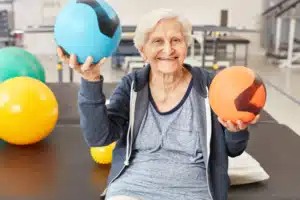After suffering a stroke, it might be harder to get all the nutrients you need. Your healthcare provider can assure you are getting good nutrition. Healthy eating can improve your health and reduce your risk of having another stroke.
There may be conditions that make it difficult to eat and drink, such as:
- Difficulty using your hands or arms.
- Problems with memory problems where you forget to eat and drink.
- Having no appetite or not feeling hungry.
- Dysphagia or problems swallowing.
These challenges may make it difficult to get all the nutrients you need and can slow down recovery. Having the knowledge of what foods to eat and avoid will help with planning nutritious meals and
Here are the five food groups you can enjoy every day:
- Plenty of colourful vegetables and fruit.
- High in fibre and preferably wholegrain bread, cereals, rice, pasta, noodles, couscous, oats, barley high in fibre and preferably wholegrain.
- Lean meats, poultry, fish, eggs, tofu, nuts, seeds, legumes, and beans.
- Milk, yogurt, and cheese, mostly reduced fat.
- Plenty of water.
Fruit and vegetables contain antioxidants, which can help reduce damage to blood vessels. They also contain potassium which can help control blood pressure. The fibre in fruit and vegetables can lower cholesterol. Folate – which is found in green leafy vegetables, may reduce the risk of stroke. Wholegrains and cereals also contain fibre and folate.
What Foods to Limit when Planning Meals After a Stroke?
You should try to limit foods that have saturated fat, added salt, and added sugars, such as biscuits, cakes, pastries, pies, processed meats, commercial burgers, pizza, fried foods, potato chips, and other savoury snacks.
This also includes sugar-sweetened soft drinks and cordials, fruit drinks, vitamin waters, energy drinks and sports drinks.
Learning and making new recipes with your family or caregiver can be fun. Have you ever thought of making vegetarian tacos with cauliflower? It could be fun and, best of all, healthy for you.

You can get the recipe HERE
For more recipes, visit the Heart and Stroke website
If your parent or loved one needs ongoing care at home after a stroke, the healthcare team at Promyse is there to help. Our Personal Support Workers, managed by a Nurse Case Manager, deliver a high quality of care. We provide care according to your parent’s needs – from daily visits to around-the-clock care.



